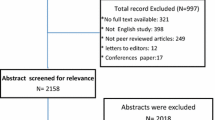Abstract
Spiritual care is deep rooted in the traditional ancient system of medicine. However, due to lack of high grade evidences, practitioners of modern system of medicine are hesitant to inculcate spirituality in their clinical practice. This paper is an attempt to basic understanding of spiritual care therapy, current evidences for it and the challenges for incorporation in the allopathic system of medicine.
Similar content being viewed by others
References
Anandaraj, G., & Hight, E. (2001). Spirituality and Medical practice: Using the HOPE questions as a practical tool for spiritual assessment. American Family Physician,63, 81–88.
Asadi-Lari, M., Madjd, Z., & Goushegir, S. A. (2008). Gaps in the provision of spiritual care for terminally ill patients in Islamic societies—a systematic review. Advances in Palliative Medicine,7, 73–80.
Bussing, A., Ostermann, T., & Matthiesen, P. F. (2005). Role of religion and spirituality in medical patients: Confirmatory results with the SpREUK questionnaire. Health and Quality of Life Outcomes,3, 10.
Chen, R.-C. (2009). The spirit of humanism in terminal care: Taiwan experience. The Open Area Studies Journal,2, 7–11.
Curlin, F. A., Sellergren, S. A., & Lants, J. D. (2007). Physicians’ observations and interpretations of the influence of religion and spirituality on health. Archives of Internal Medicine,167, 649–654.
European Association for Palliative Care. (2016). Available at http://www.eapcnet.eu/themes/clinicalcare/spiritualcareinpalliativecare.aspx. Accessed on May 06 2016.
Ghosh, A. K. (2003). The role of religion/spirituality in the medical curriculum. Minnesota Medicine,86, 5.
Grant, D. (2004). Spiritual Interventions: how, when and why nurses use them. Holistic Nursing Practice,18, 36–41.
Haase, J. E. (2004). The adolescent resilience model as a guide to interventions. Journal of Pediatric Oncology Nursing,21, 289–299.
Hart, D., & Schneider, D. (1997). Spiritual care for children with cancer. Seminars in Oncology Nursing,13, 263–270.
Hicks, J., Bartholomew, J., Ward-Smith, P., & Hutto, C. J. (2003). Quality of life among childhood leukemia patients. Journal of Pediatric Oncology Nursing,20, 192–200.
Koening, H. G., Hooten, E. G., Lindsay-Calkins, E., & Meador, K. G. (2010). Spirituality in medical schools curricula. findings from a national survey. The International Journal of Psychiatry in Medicine,40, 391–398.
Kozhikode: Institute of Palliative Medicine. (2016). Available from http://www.palliaitvecare.in. Accessed on May 06 2016.
Lucchetti, G., & Granero, A. (2010). Integration of spirituality courses in Brazilian medical schools. Medical Education,44, 527.
Lutgendorf, S. K., Russel, D., & Ulrich, P. (2004). Religious participation Interleukin 6 and mortality in older adults. Health Psychology,23, 465–475.
Mc Cormick, T. R. (2014). Spirituality in medicine. Ethics in medicine. Available at https://depts.washington.edu/bioethx/topics/spirit.html. Accessed on September 08 2014.
McMillan, K. (2016). Employee spiritual care: Supporting those who care for others. Journal of Christian Nursing,33, 98–101.
Neely, D., & Minford, E. J. (2008). Current status of teaching on spirituality in UK medical schools. Medical Education,42, 176–182.
Paal, P., Roser, T., & Frick, E. (2014). Developments in spiritual care education in German-speaking countries. BMC Medical Education,14, 112.
Peach, H. G. (2003). Religion, spirituality and health: how should Australia’s medical professionals respond? Medical Journal of Australia,178, 86–90.
Puchalski, C. (2006). Spirituality and medicine: curricula in medical education. Journal of Cancer Education,21, 14–18.
Puchalski, C. M., & Larson, D. B. (1998). Developing curricula in spirituality and medicine. Academic Medicine Journal of the Association of American Medical Colleges,73, 970–974.
Puchalski, C. M., Vitillo, R., Hull, S. K., & Reller, N. (2014). Improving the spiritual dimension of whole person care: Reaching national and international consensus. Journal of Palliative Medicine,17, 642–656.
Ramakrishnan, P., Karima, A., Kuntaman, K., Shukla, A., Ansari, B. K., Rao, P. H., et al. (2014) Religious/Spiritual characteristics of Indian and Indonesian physicians and their acceptance of spirituality in health care: A cross cultural comparison. Journal of Religion and Health (Epub ahead of print).
Schrijvers, D., & Meijnders, P. (2007). Palliative care in adolescents. Cancer Treatment Reviews,33, 616–621.
Schultz, M., Lulav-Grinwald, D., & Bar-Sela, G. (2014). Cultural differences in spiritual care: Findings of an Israeli oncologic questionnaire examining patient interest in spiritual care. BMC Palliative Care,13, 19.
Selman, L., Young, T., Vermandere, M., Stirling, I., & Leget, C. (2014). Research priorities in spiritual care: An international survey of palliative care researchers and clinicians. Journal of Pain and Symptom Management,48, 518–531.
Sharma, H., Jagdish, V., Anusha, P., & Bharti, S. (2013). End-of-life care: Indian perspective. Indian Journal of Psychiatry,55, S293–S298.
Spiritual care at the end of life: A systematic review of the literature. Available at https://www.gov.uk/government/uploads/system/uploads/attachment_data/file/215798/dh_123804.pdf. Accessed on May 07 2016.
Spiritual care matters. An introductory resource for all NHS Scotland staff. Available at http://www.nes.scot.nhs.uk/media/3723/spiritualcaremattersfinal.pdf. Accessed on May 06 2016.
Surbone, A., Baider, L., Weitzman, T. S., Brames, M. J., Rittenberg, C. N., Johnson, J., et al. (2010). Psychosocial care for patients and their families is integral to supportive care in cancer: MASCC position statement. Supportive Care in Cancer,18, 255–263.
Author information
Authors and Affiliations
Corresponding author
Rights and permissions
About this article
Cite this article
Kannan, S., Gowri, S. Spiritual Care: Define and Redefine Self. J Relig Health 59, 470–483 (2020). https://doi.org/10.1007/s10943-016-0269-9
Published:
Issue Date:
DOI: https://doi.org/10.1007/s10943-016-0269-9




